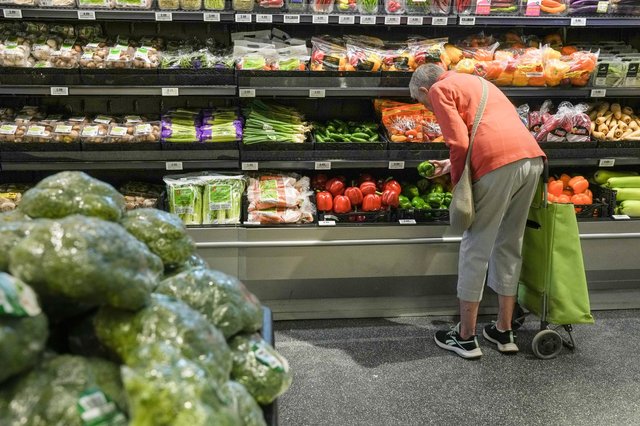
Following Wednesday’s interest rate cut by the Bank of Canada, data from Statistics Canada show that some food prices are also coming down in Canada.
The federal agency published the data list online and it shows year-over-year, from July 2023 to July 2024, a number of items are a little bit more affordable for shoppers.
Those items include cucumbers, grapes, iceberg lettuce, margarine, crackers, canned tuna, shrimp, bacon, spinach, frozen berries, pasta, flour, and roasted and ground coffee.
However, items that are often imported, like olive oil and baby formula, are way up. The average price of olive oil last July was $12.25, while as of this July it was listed at $16.68. Last summer, a 900-gram canister of baby formula was listed at $37.49, now it’s $45.69.
Sylvain Charlebois, the director of the Agri-Food Analytics Lab at Dalhousie University, says chicken, whether whole or in parts, and eggs are coming down in price everywhere across the country, except in B.C.
“It’s up to the [BC Chicken Marketing] board, it’s not up to grocers. With supply management, farmers have a huge say in terms of how much things cost, and feed costs are pretty significant in B.C. compared to other places in Canada, and that’s the main reason why farmers tend to push prices higher.”
He points out that feed is often brought in from other provinces, typically from the Prairies, and stresses higher chicken and egg prices are folded into restaurant prices.
“I would say right now for chicken breast, chicken thighs, even a whole chicken in B.C., on average it’s about 18 to 30 per cent more expensive in B.C.”
Charlebois says the drop in prices for some items is happening because grocers are “discounting a whole lot right now. They’re way more aggressive.”
“You’re seeing more opening of discount stores across the country and that’s pushing prices lower. You can see across the supply chain, even in manufacturing, you can see margins are being readjusted and companies feel that they have to cope with a more frugal market.
“Let’s face it, consumers are more careful. They’re spending less on food per capita in Canada for a long time now, that’s why the industry is adjusting.”
Looking ahead to the fall and winter, Charlebois expects the drop in some food prices will continue.
“Many categories are trading lower. The meat counter is a bit of an exception. We don’t expect meat products to be cheaper. Dairy neither. Dairy is a bit of a mixed bag, but… rice is getting cheaper. Bread is trending downward as well.”